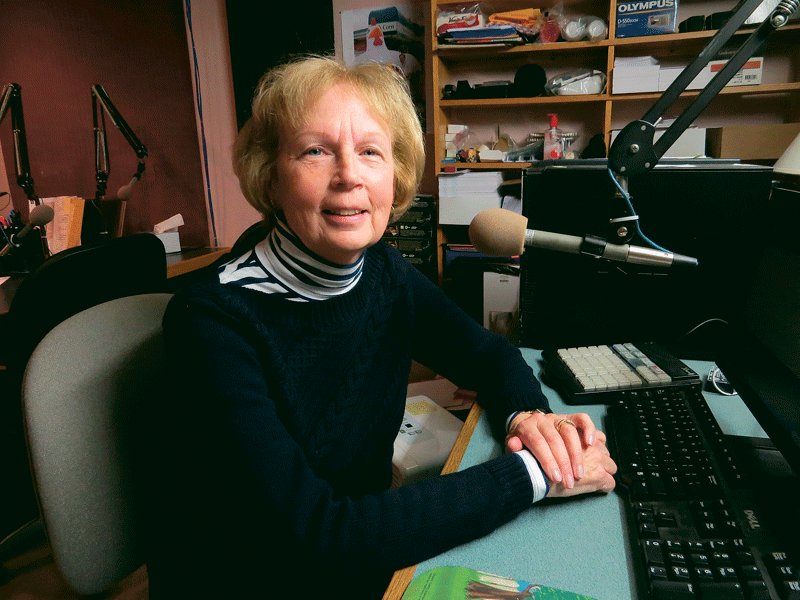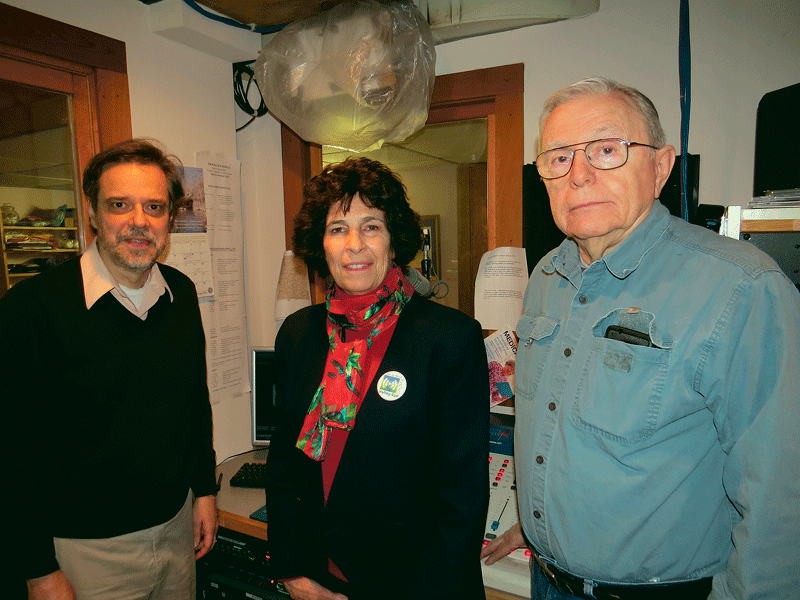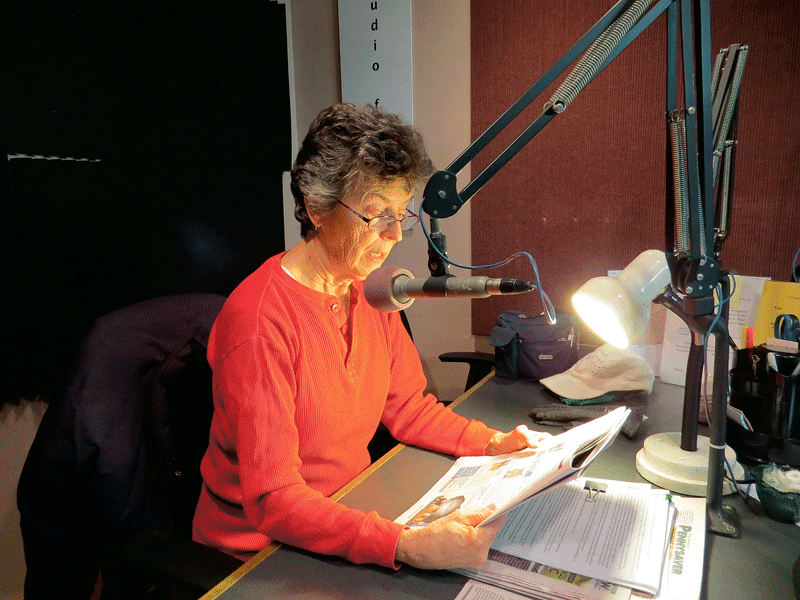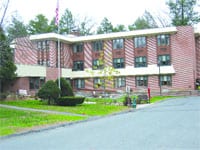All the News That’s Fit to Hear – Valley Eye Radio Provides Information, Connectivity to Listeners

Pat Duperre was getting ready to retire. And as she recalls those days and her plans for the ones to come, she remembers thinking — actually knowing — that she would be doing a good deal of volunteer work within her community. In fact, she was already working to find something meaningful to do with her time.
Instead, something meaningful found her, as she put it, and she wound up volunteering in a way she could not have imagined just a few months earlier.
“My son suffered a massive heart attack, and as a result, he lost his sight,” she recalled. “And I saw what he went through, the struggles that he went through to adapt to one day having sight and the next day having nothing.”
These observations coincided with a picture she saw in her local newspaper of Barbara Loh, executive director of Valley Eye Radio (VER), receiving a check from the East Longmeadow Lions Club to help continue that organization’s intriguing mission.
To make a long story a little shorter, Duperre soon become a part of that mission, which is to bring news stories, like the one that inspired her, to the blind, visually impaired, and those not able to read for themselves due to a disability.
These days, she reads the Republican live every Wednesday morning from 9 to 11, delivering all kinds of news — from front-page stories to the obituaries (they have their own time slot, 10 a.m., due to their significance for many readers) to notes on blood drives — and with what she called “a little bit of humor.”
But Loh told HCN — another one of the many publications read on the air — that dozens of volunteers like Duperre bring much more than the day’s news into listeners’ homes.
“We want to help people, bottom line, to have better lives once they have challenges they never anticipated,” she explained, adding that this assistance begins with the day the special radio that delivers the Valley Eye Radio signal is delivered to one’s home by still another volunteer. “We’re giving people hope that their lives will not be in significant decline because of the impact of this disability.”
VER has been providing this hope for more than 40 years now, said Harold Anderson, programming coordinator for the nonprofit organization, noting that, while the basic mission hasn’t changed over that time, many things have, and VER has adjusted accordingly.
There are new publications, such as HCN, to read, he said, adding that, in recognition of significant demographic changes within the region, Spanish-language magazines and newspapers are now read as well.
Meanwhile, the need for the program’s services is growing. Indeed, as the population ages, more people are suffering from visual impairment, said Loh, adding that Valley Eye Radio is responding by being more aggressive in its efforts to tell its story and thus gain more of the many forms of support it needs — from financial contributions to additional volunteers — to carry out its mission.
As for those volunteers, they are, in most respects, the lifeblood of the organization, said Loh, adding that many, like Duperre, have a personal connection to its mission.

For this issue, HCN takes an in-depth look at VER and the vital service it prides to its listeners. This article might be too long to be read over the airwaves — readers prefer stories that can be digested in 10 minutes or less — but that can’t be helped. It takes more than a few column inches to properly convey the importance of this work and especially the passion of those who volunteer and thus make it all happen.
Hear All About It
While growing up in rural Maine, Eileen Richard didn’t get to watch much television.
“My mother didn’t believe in it,” she recalled, adding quickly that she did believe in books, and this was a passion soon shared by her four daughters, who literally couldn’t wait for the next visit from the bookmobile.
And it’s a passion that has never left Richard, who began reading for the blind in various capacities some four decades ago. She has worked and volunteered in many settings since, and actually came back to reading for the blind (at VER) because, in her previous role as a volunteer at Baystate Children’s Hospital, the patients were so absorbed by their electronic devices that there was no call for Richard to read to them.
So she started reading the Daily Hampshire Gazette on VER and thoroughly enjoys every minute of it, especially the small items on animals up for adoption.
“I call it my pet project, and I have a tendency to read them as if I am the animal involved,” she explained. “If it’s a male dog, I might lower my voice and say, ‘hi … boy, you really need to meet me; I’m a wondrous pet, and I’m friendly, but not too friendly — I won’t jump all over you.’
“I really try to put my personality into whatever pet it is, be it a rabbit, a cat, or a dog,” she said, adding that she reads to people as if she were sitting in a room with them. “I like to read with personality.”
And the listeners like that personality, apparently, said Loh, adding that Richard has many fans, especially Larry Humphries, a long-time VER board member who insisted on having Richard attend the gathering marking his retirement from the board because he wanted to meet the woman behind the voice.
“You feel like you are so cared for, even on the radio, when you are listening to Eileen,” said Loh. “It really is amazing.”
The same can be said of the more than 50 people who volunteer in various ways for VER, and especially those who take to the mic to bring the news — and some companionship — home.
It has been this way since 1977, said Anderson, noting that the station is now part of a network of six stations throughout the Bay State operating under the name Talking Information Center (TIC).
Volunteers now read a number of daily weekly and monthly publications that cover Hampden and Hampshire counties, he said, adding that the service is vital because newspapers are usually the only source of what would be considered very local news.
By that, he meant everything from obituaries to church outings; from Little League scores to letters to the editor; from the daily horoscope to service-club gatherings (yes, like that photo of Loh receiving a check from the Lions Club).
That kind of news isn’t available on traditional radio or television, and one couldn’t get it on their cell phone, either, Anderson noted, adding that VER brings it to those who have lost their sight or seen it diminish to the point where they can’t read anymore.
And it delivers much more than the daily or weekly news, he went on, adding that, over the past few years, VER has been taking its act on the road, if you will, and, by doing so, it is taking its listeners to various events through that special radio that sits in their home.
“We’ve been going out into the community more, and I’ve been doing more interviews and recordings at various events to try to bring people even more than just the newspapers,” Anderson explained. “There are a lot of events going on with some very important information for people, and if you have that kind of disability, you’re reliant on someone to bring you someplace, and it’s often not possible to get to some things.
“So I’ve been going out and doing those kinds of things,” he went on, adding that he has taken VER and its listeners to everything from elder-care conferences to the recent Thrive After 55 Fair at Western New England University, to a senior symposium at Greenfield Community College.
When the Wall That Heals, a traveling replica of the Vietnam War Memorial in Washington, D.C., came to West Springfield, VER was there, with Anderson interviewing a number of veterans to capture their reflections on the experience.
Such outreach, as Anderson calls it, is a win-win for VER in that it provides additional services to listeners while also giving the nonprofit invaluable exposure at a time when many still don’t know about the station or its mission.
And that’s critical, because all this programming requires resources, said Anderson and Loh, adding that VER relies on a number of funding sources, including the state (although it hasn’t received any money from the Commonwealth since last summer), grants from area foundations such as the Community Foundation and Beveridge Foundation, individuals, and area businesses and civic groups — for example, the Lions Club underwrites the obituaries, A to Z Movers underwrites sports, and the law firm Shatz, Schwartz and Fentin underwrites elder-law news.
The Latest Word
Chip Costello, another volunteer, also has a personal connection to VER and its mission — actually, several of them.
While he was studying for his MBA at Western New England University, the nonprofit became the subject of a project involving several of the students.
“The point of the exercise was to go over and study it as a nonprofit organization, so we looked at it from that perspective,” he recalled. “I thought their mission was very interesting.”
Much later, while working at MassMutual as a national sales manager for the annuity product line, a different, much deeper connection was formed.
“My mother, who was a voracious reader, developed macular degeneration, and it got to the point where she just couldn’t read anymore,” he explained. “So I would go over there and read things to her. That’s why this is such a natural fit, especially when you can see the kind of impact such a condition can have of someone, when novels or stories or essays are so important to them, and suddenly they don’t have access to that. And it’s so easy to help.”
Costello shows up at the Valley Eye Radio studios on Hampden Street in Springfield (generously donated by WGBY) at 8 a.m. each Wednesday to prerecord the reading of stories in HCN’s sister publication, BusinessWest.
With his background in business, he finds that subject matter interesting, and understands that the stories he’s reading resonate with individuals who worked at a specific company or in a certain field. And the work enables him to give back to the community — something his former employer always stressed — in a way that he knows, from personal experience, can improve quality of life.
“I like the idea of working with nonprofits,” said Costello, who also teaches Gaelic and volunteers at his church now that he’s ‘retired.’ “I enjoy this and continue to do it because I feel it’s important.”
David Manning agreed. He’s a very recent addition to the corps of volunteers — he’s only been doing this for roughly two months — but he can already see how he’s changing lives by reading the Chicopee Register and other material.
Like Richard, he was drawn to the organization by the kind of local news content — in this case an editorial on VER and its mission that appeared in the Gazette and the Amherst Bulletin — that he would later be reading on the air.
“It rang a bell with me because, many years ago, when I started working, my interest was in working with deaf-blind children,” said Manning, adding that he has a deaf son and that the original plan for his career was to train at the Clarke School for Hearing and Speech to work with deaf children and later go on to the Perkins School in Boston to work with deaf-blind children.
However, he liked the work at the Clarke School so much, he stayed there 45 years. He retired and did ‘old-man things,’ as he called them, got sick of that, and decided that he needed to get back to do something meaningful. Those thought patterns coincided with his reading of that editorial on VER.
Today, he reads “anything and everything,” as he put it, a collective that includes everything from the Chicopee paper to the grocery inserts, with the latter running neck and neck with obituaries as perhaps the most popular segments on VER.
“I’ll tell people how much roast beef is a pound,” he told HCN, adding that the service provided by VER resonates with him because he’s seen how his son, now in his 50s, can lose a sense of connectivity through his disability.
“I’ve seen how disabilities can affect people,” he noted. “I’ve seen how my son can sit in the middle of a crowd and not know what’s going on because he can’t hear what they’re talking about. That has helped sensitize me to the position a person with a disability finds themself in.”
Sound Reasoning
Upon wrapping up her interview with HCN, Richard left for the studio and commenced reading some news from the Gazette.
Before long, she was taking the role of a cat up for adoption and putting on what could only be described as a hard sell.
Or maybe it was a soft sell, because, as advertised, she was talking to the audience in a calming voice and as she would if she was sitting with someone in her living room.
As Loh put it earlier, you have to feel like you’re cared for, even on the radio.
This is the magic of Valley Eye Radio, which brings its listeners all the news that’s fit to hear and, more importantly, provides those most precious commodities — companionship and connectivity.




Comments are closed.